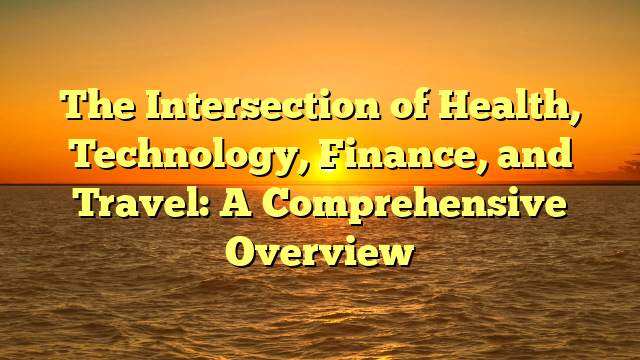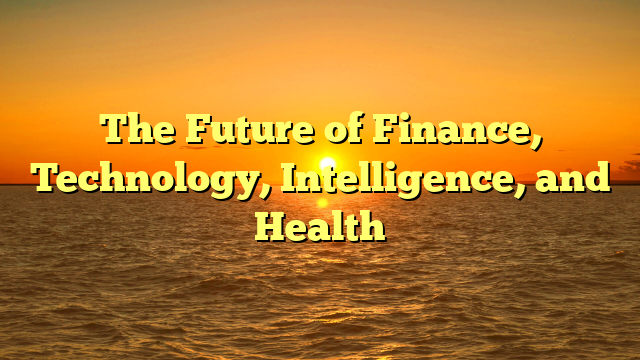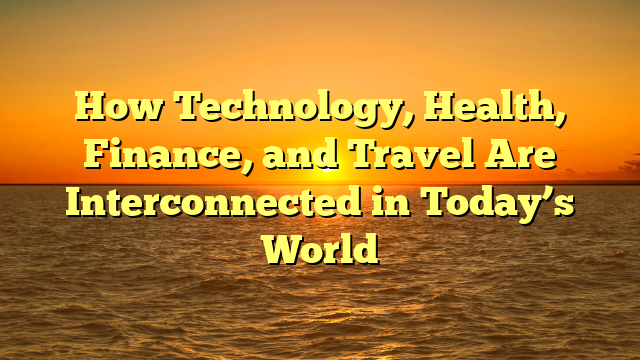In today’s rapidly evolving world, the interplay between health, technology, finance, and travel has never been more profound. These sectors are increasingly intertwined, shaping our lives in ways that were once unimaginable. This article explores the current trends, challenges, and opportunities within each of these fields, highlighting their impact on our daily lives.
Health and Well-being in the Digital Age
Health is a vital aspect of life that affects every individual. In the past few decades, the field of healthcare has undergone significant transformation. Technological advancements have played a crucial role in this change, enhancing both the accessibility and quality of medical services.
One of the most notable trends in healthcare is the rise of telemedicine. This technology allows patients to consult with healthcare professionals remotely, eliminating the need for travel. Virtual consultations have become a lifeline, particularly for those living in remote areas or with mobility issues. Telemedicine has proved invaluable during the COVID-19 pandemic, where physical distancing became essential, enabling doctors to diagnose and treat patients from a distance.
Another area of innovation is the use of wearable devices. Smartwatches like Fitbit and Apple Watch are no longer just about tracking steps; they now monitor vital signs such as heart rate, sleep patterns, and even blood oxygen levels. These devices have made personal health data more accessible and actionable, encouraging users to take proactive steps toward better health.
In addition, AI-powered tools are revolutionizing diagnostics. Machine learning algorithms can now analyze medical images, identify patterns in patient data, and assist doctors in making quicker and more accurate diagnoses. AI-enhanced healthcare promises to reduce human error, improve patient outcomes, and make healthcare more efficient overall.
The Role of Technology in Modern Society
Technology is a force that has reshaped nearly every aspect of life, from how we communicate to how we work and entertain ourselves. The advent of artificial intelligence (AI) has been one of the most transformative innovations, with applications in everything from customer service to manufacturing. AI systems can learn from vast amounts of data, making them capable of improving themselves over time. This has led to more personalized services in fields like retail, banking, and healthcare.
IoT (Internet of Things) are another innovation that is becoming increasingly prevalent. Devices like voice assistants, smart thermostats, and security cameras can be controlled remotely, allowing homeowners to enhance convenience, security, and energy efficiency. This has sparked a wave of interest in home automation, making it a staple of modern living.
In addition, the rise of 5G networks promises to further accelerate the digital revolution. With faster internet speeds and more reliable connectivity, 5G will enable innovations in areas such as virtual reality (VR), augmented reality (AR), and autonomous vehicles. These technologies, which were once considered futuristic, are now within reach, offering exciting possibilities for the future.
However, with these technological advances come challenges. Issues such as data privacy, cybersecurity, and the digital divide have sparked debates and necessitate careful consideration. As more personal information is stored online, ensuring its security has become paramount. Similarly, the rapid pace of technological change means that not everyone has equal access to these innovations, which could widen societal inequalities.
Finance: Navigating a Digital Economy
The world of finance has also seen significant shifts, particularly with the rise of digital currencies and the growing use of blockchain technology. Cryptocurrency like Bitcoin and Ethereum have disrupted traditional financial systems, offering an alternative to fiat currencies. These digital assets are decentralized, meaning they operate outside the control of central banks, making them attractive to individuals seeking more control over their money.
In addition to cryptocurrencies, blockchain technology has found applications beyond digital currency. It is now used in supply chain management, voting systems, and even healthcare to ensure transparency and security. Blockchain has the potential to streamline processes, reduce fraud, and increase efficiency in various industries.
Moreover, fintech (financial technology) companies have emerged as major players in the financial sector. These companies provide a wide range of services, including mobile banking, investment platforms, and peer-to-peer lending. The rise of mobile payment systems like PayPal, Venmo, and Apple Pay has made financial transactions faster and more convenient than ever before, further driving the shift toward a cashless society.
However, the digitalization of finance has also introduced new risks. Data breaches and fraud are major concerns in the world of digital finance. As more people rely on online banking and digital transactions, safeguarding sensitive financial data has become a top priority.
Travel in the Modern Era: Embracing Technology
Travel is another area where technology has had a profound impact. In the past, planning and booking travel could be a cumbersome process, involving multiple agents and long waits. Today, with just a few clicks, travelers can compare flights, book hotels, and arrange for activities through online platforms like Expedia, Booking.com, and Airbnb.
In addition to convenience, technology has improved the travel experience itself. Smart travel gear, for instance, is designed to make the journey more efficient. Luggage with built-in GPS tracking, weight sensors, and even phone chargers have become popular among frequent travelers. akun demo has reduced the chances of lost luggage and made it easier to manage personal belongings.
Moreover, travel companies are increasingly using AI to offer personalized recommendations. Machine learning algorithms analyze user preferences, past trips, and even social media activity to suggest tailored itineraries, hotels, and experiences. This level of personalization enhances the travel experience, allowing people to discover new destinations and activities that align with their interests.
However, the travel industry is not without its challenges. The COVID-19 pandemic has had a devastating impact on global travel, with many countries implementing travel restrictions and quarantine measures. As the industry recovers, there is a growing emphasis on health and safety protocols, with airlines and hotels adopting technologies like contactless check-ins and sanitation robots to reduce the spread of infections.
Conclusion: A Future Driven by Innovation
As we look toward the future, the convergence of health, technology, finance, and travel is creating new opportunities and challenges. These sectors are continuously evolving, with innovation driving progress in all areas. Whether it’s through advancements in telemedicine, the growth of AI and blockchain, or the transformation of the travel experience, technology is playing a pivotal role in shaping our world.
While these changes bring about significant benefits, they also require careful consideration of their ethical, social, and economic implications. As we embrace these innovations, it is important to ensure that they are accessible, secure, and beneficial for everyone.
Ultimately, the future will likely be defined by how we adapt to and integrate these technological advancements into our daily lives. With a focus on innovation, sustainability, and inclusivity, the next generation of health, technology, finance, and travel will continue to offer exciting possibilities for a better world.
The Intersection of Health, Technology, Finance, and Travel: A Comprehensive Overview


